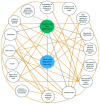Celiac Disease and Gluten-Free Diets: A Path or Barrier to Food (In)Security?
- PMID: 40573067
- PMCID: PMC12195763
- DOI: 10.3390/nu17121956
Celiac Disease and Gluten-Free Diets: A Path or Barrier to Food (In)Security?
Abstract
Background: Celiac disease (CD) is an autoimmune condition triggered by gluten ingestion. The only effective treatment is adherence to a gluten-free diet (GFD), which is challenging due to the widespread presence of gluten in foods and the lack of physical and financial access to gluten-free options, among other factors that can lead to food nutrition insecurity (FNI). FNI, defined as the difficulty in accessing adequate food, is a factor that not only affects the need to adhere to a GFD but also compromises adherence itself. Objective: Review the scientific literature on the association between FNI, celiac disease, and adherence to a gluten-free diet. Methodology: This integrative review was conducted systematically using the PubMed, Scopus, and Web of Science databases, selecting studies that evaluated food security and insecurity among celiac patients. The keywords used with the Boolean operators were "celiac disease" AND/OR "gluten-free diet" AND "food insecurity" AND/OR "food security". The search did not restrict language or geographic location, and studies were selected independently by two reviewers. Results: Ten publications met the inclusion criteria and were selected for the integrative review. FNI has been studied over the last five years in CD patients, but there is a lack of studies in different regions. FNI negatively affects the quality of life for those with CD and contributes to more severe symptoms and lower adherence to the GFD, especially in children and low-income families. Factors associated with higher risks of FNI in those with celiac disease include income, education, living in rural or non-central areas, and availability. These factors reinforce the negative impact of the association between FNI and adherence to the GFD in CD patients. Conclusions: The study of FNI in celiac individuals is a relatively recent development. The prevalence of FNI in this population is concerning and higher than in the general population, and it is associated with adherence to the GFD. Therefore, this topic demands extensive public policies to improve the health, quality of life, adherence, and treatment of CD patients.
Keywords: celiac disease; food insecurity; food security; gluten-free diet.
Conflict of interest statement
The authors declare no conflicts of interest.
Figures
Similar articles
-
Effects of a gluten-reduced or gluten-free diet for the primary prevention of cardiovascular disease.Cochrane Database Syst Rev. 2022 Feb 24;2(2):CD013556. doi: 10.1002/14651858.CD013556.pub2. Cochrane Database Syst Rev. 2022. PMID: 35199850 Free PMC article.
-
Gluten-Free Diet Adherence Tools for Individuals with Celiac Disease: A Systematic Review and Meta-Analysis of Tools Compared to Laboratory Tests.Nutrients. 2024 Jul 26;16(15):2428. doi: 10.3390/nu16152428. Nutrients. 2024. PMID: 39125309 Free PMC article.
-
Enhancing life with celiac disease: unveiling effective tools for assessing health-related quality of life.Front Immunol. 2024 Apr 29;15:1396589. doi: 10.3389/fimmu.2024.1396589. eCollection 2024. Front Immunol. 2024. PMID: 38742113 Free PMC article.
-
Microbiome gut community structure and functionality are associated with symptom severity in non-responsive celiac disease patients undergoing a gluten-free diet.mSystems. 2025 Jul 22;10(7):e0014325. doi: 10.1128/msystems.00143-25. Epub 2025 Jun 6. mSystems. 2025. PMID: 40476734 Free PMC article.
-
The relationship between gluten free diet adherence and depressive symptoms in adults with coeliac disease: A systematic review with meta-analysis.Appetite. 2018 Jan 1;120:578-588. doi: 10.1016/j.appet.2017.10.017. Epub 2017 Oct 16. Appetite. 2018. PMID: 29050807
References
-
- Al-Toma A., Volta U., Auricchio R., Castillejo G., Sanders D.S., Cellier C., Mulder C.J., Lundin K.E.A. European Society for the Study of Coeliac Disease (ESsCD) guideline for Coeliac Disease and Other Gluten-Related Disorders. United Eur. Gastroenterol. J. 2019;7:583. doi: 10.1177/2050640619844125. - DOI - PMC - PubMed
-
- Taraghikhah N., Ashtari S., Asri N., Shahbazkhani B., Al-Dulaimi D., Rostami-Nejad M., Rezaei-Tavirani M., Razzaghi M.R., Zali M.R. An Updated Overview of Spectrum of Gluten-Related Disorders: Clinical and Diagnostic Aspects. BMC Gastroenterol. 2020;20:258. doi: 10.1186/s12876-020-01390-0. - DOI - PMC - PubMed
Publication types
MeSH terms
LinkOut - more resources
Full Text Sources
Medical
Miscellaneous



